The Pankhurst sister sent from Aberdeen to Australia with £20 and a one-way ticket (original) (raw)
They were the most famous family in the battle to secure votes for women.
Emmeline Pankhurst and her daughters, Christabel and Sylvia, were among the driving forces behind the campaign which split large sections of Britain at the start of the 20th century.
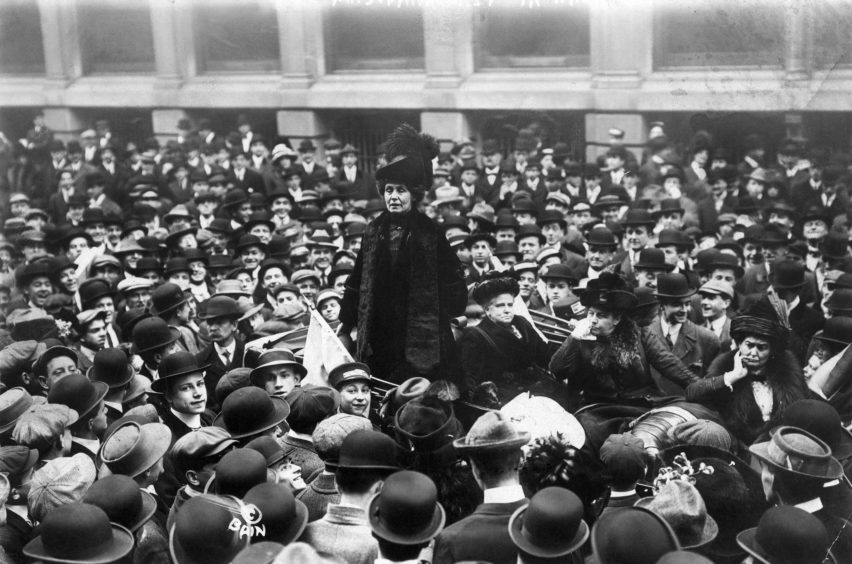
Emmeline Pankhurst speaking at a rally in 1918.
Yet there was another female member of the clan who played a pivotal role in a tempestuous period of British politics – and Adela Pankhurst spent time in the early part of her life in Aberdeen and Dundee as she worked with other suffragettes to win their struggle.
A powerful orator, whose diminutive stature belied her ability to win over the rowdiest of crowds, she was arrested after flinging stones at a building in Dundee where Winston Churchill was making a speech – and she subsequently went on hunger strike behind bars.
Indeed, her determination to use whatever methods were necessary, including violence, eventually led to a massive rift between her and her mother, whose later autobiography made not a single mention of her youngest daughter.
And they parted company in 1914 when Adela was “persuaded” to emigrate to Australia by Emmeline, who gave her £20, a one-way boat ticket and a letter of introduction to a Melbourne feminist, Vida Goldstein.
She never saw her mum or her sisters again.
The remarkable story has emerged through work done by Janet Pickering, a trustee and volunteer at the Pankhurst Centre in Manchester, which is based at the family’s former home, and is where the Women’s Social and Political Union was founded in 1903.
The venue houses a small museum, dedicated to its one-time inhabitants and their contribution to the Suffragette movement, who eventually gained votes for women, but not until after the horrors and depletion of male workers during the First World War.
By all accounts, Adela was a sickly and nervous child. Positioned as she was between two brothers, Frank and Harry, who died at the age of four and 20, she struggled to gain recognition and attention: not something which applied later on.
In common with her sisters, she attended the fee-paying Manchester Girls High School from the age of eight in 1893, but while she was intelligent, she hated the rigid discipline of the institution and was also unhappy at home.
So she ran away at the age of 11 and, when eventually found, refused to speak. Enough was enough for her mother – Adela was sent to stay with an aunt in Aberdeen and the Granite City loomed large in her existence for the next few years.
Working to topple a Liberal bastion
In 1906, the Liberal Party won a general election with a landslide majority. But while some MPs were sympathetic to the women’s suffrage, it soon became clear that the leadership had no intention of enacting legislation to extend the vote.
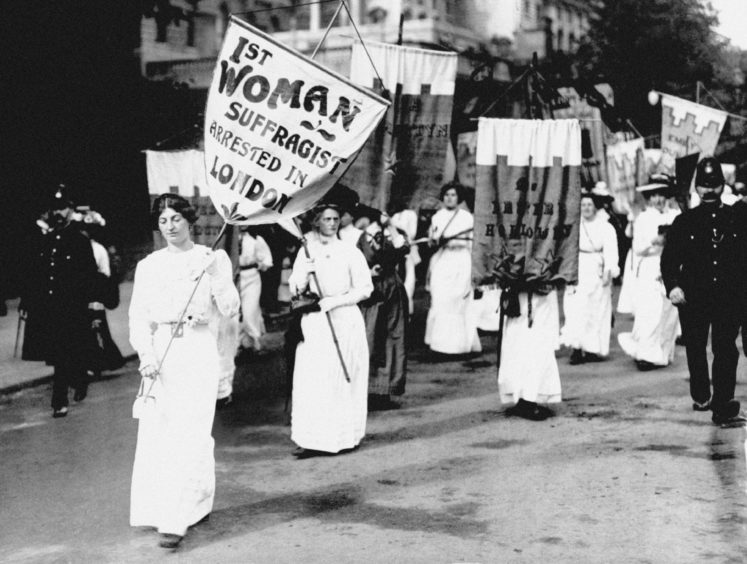
Suffragettes marching to protest the first arrest of a suffragette in London.
And that was the catalyst for the WSPU to embark on an aggressive anti-Government campaign at a number of by-elections which took place in the next few years.
Mrs Pickering said: “In early 1907, Adela and Helen Fraser, the Scottish organiser for the WSPU, led a campaign against Liberals at the South Aberdeen by-election.
“Helen later recalled: ‘I met her at the station and was horrified at her breathing. I took her to lodgings and sent for the diction who, like me, was very critical of her having been allowed to travel…she had pneumonia’.
“None the less, the campaign was a success and the Liberal majority of George Birnie Esslemont was reduced from 4,000 to 400.
“The Aberdeen Free Press reported positively that their efforts ‘showed the movement is led by women of culture, high character and intense moral earnestness’.
“Buoyed by this, a WSPU branch was opened in Aberdeen by Caroline Phillips, who worked on the Aberdeen Daily Journal (a forerunner of the current Press and Journal).
“Caroline (from Kintore) was one of only a handful of women journalists at the time and risked her career by pursuing her Suffragette activities, which included an overnight invasion of the golf course at Balmoral to replace all the flags with WSPU colours.”
There was a sense of revolution in the air. But there were also increasing tensions between the Pankhursts about the best way to influence the movement’s progress.
Some favoured civil unrest, others advocated peaceful protest. Adela wasn’t in their ranks.
Stormy visit to Aberdeen
In December 1907, Emmeline Pankhurst made the journey to Aberdeen to disrupt a visit by the then Chancellor of the Exchequer, Herbert Asquith, at the iconic Music Hall.
But a number of Liberal women members has been invited to the event and they were unhappy about the prospect of it being ruined by the actions of the WSPU.
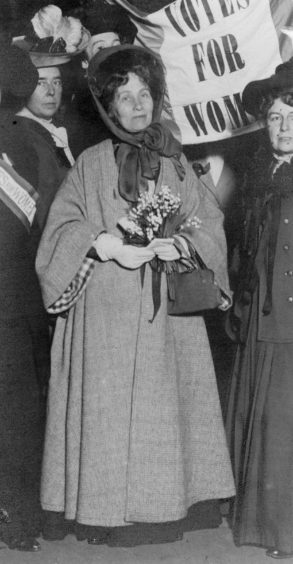
Emmeline Pankhurst.
Mrs Pickering said: “Caroline tried to mediate between the two groups, but Emmeline insisted on carrying out the planned visit, which sparked considerable controversy and correspondence in the local press.
“Further controversy was provoked when Christabel spoke at a suffrage meeting in the city the following month. The tensions between Emmeline and Christabel and the Aberdeen WSPU continued and, in 1909, Sylvia arrived to take over the running of the office on Union Street, which was shut down shortly afterwards and Caroline was ousted.”
Getting on the wrong side of Churchill
Adela Pankhurst had gradually developed the belief that the vote wouldn’t be won by pretty speeches or logical arguments. She was convinced the stakes had to be upped significantly.
She returned to Scotland in October 1909 when she and other suffragettes disrupted meetings being held by Churchill in Abernethy and Dundee.
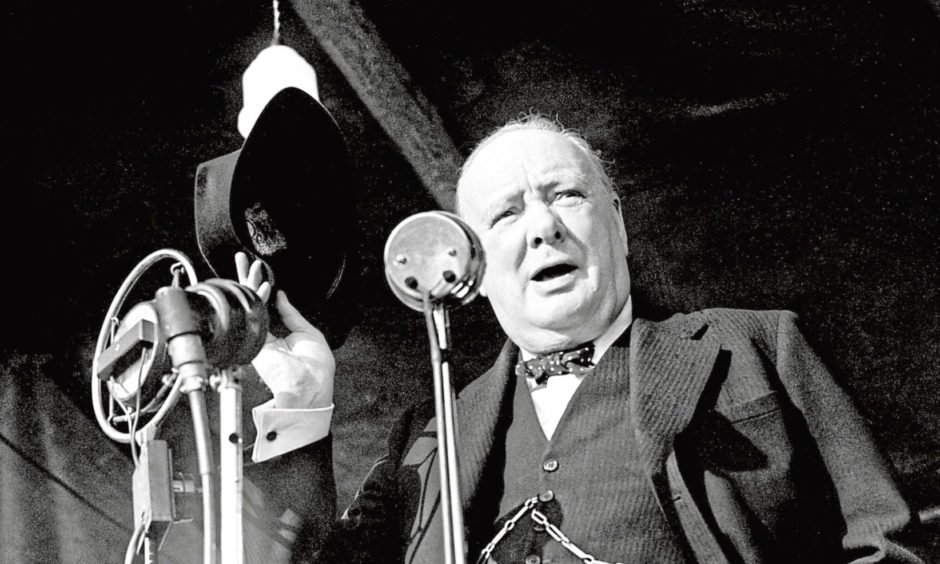
Winston Churchill.
As Mrs Pickering explained: “She was arrested and imprisoned for throwing stones at a hall where Churchill was about to speak and, whilst behind bars, went on hunger strike.
“The doctor who treated her described her as ‘a slender, undersized girl, five feet in length and seven stones in weight’. He added that she was a ‘degenerate type’.
“She was deemed to be unfit for force feeding and was released. But Churchill called her and the other protestors ‘a bunch of silly, neurotic, hysterical women’.
“During the next two years, Adela spent quite a lot of time in Scotland, working closely with Helen Fraser. Both women began to have doubts about the direction of the WSPU and there were increasing tensions between her and her mother and Christabel, who disapproved of Adela’s socialist views.
“Sylvia has also become alienated from Emmeline and Christabel and had established her own organisation, supporting working-class families in the East End of London.
“Both Adela and Sylvia were subsequently expelled from the WSPU by their mother and sister.”
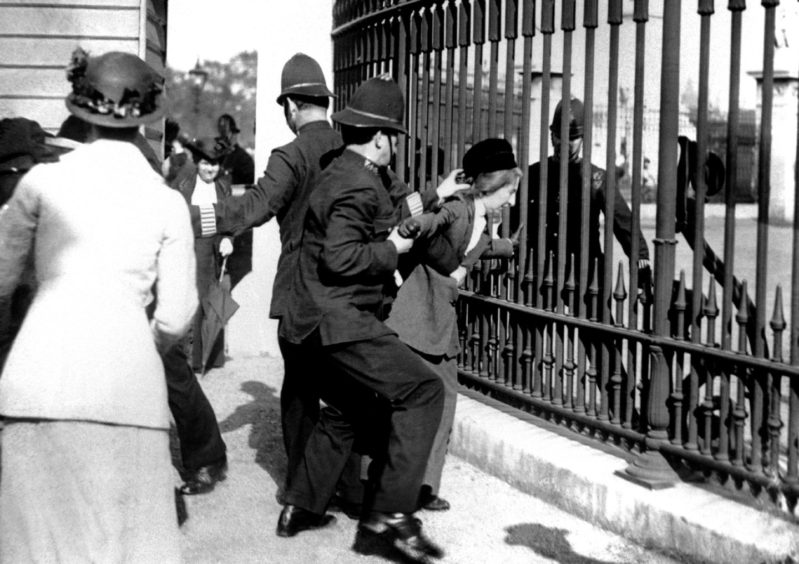
A policeman restraining a demonstrator as suffragettes gathered outside Buckingham Palace.
Yet it wasn’t enough just to ostracise Adela. On the contrary, her mum was determined she wouldn’t be allowed to cause any more problems.
In effect, she was transported to Australia, just as the old convicts had been in the 18th and 19th centuries. But although she might have been silenced in her own country, she was soon making a big noise Down Under.
Going to extremes in Australia
Her estrangement from her family didn’t prove a deterrent to Adela Pankhurst once she had completed the lengthy journey and arrived in Melbourne.
She was recruited during the First World War as an organise for the Women’s Peace Army and wrote a book Put Up the Sword, while also penning anti-war pamphlets and addressing public meetings, where she spoke out against the conflict and conscription.
In 1915 and 1916, she travelled across Australia and New Zealand, and continued her campaign in front of increasingly large crowds, with the newspapers offering substantial publicity.
Her stance was anathema to her mother and her sisters back in Britain.
Professor Sarah Pedersen of Robert Gordon University has written extensively about the suffragette movement and such stalwart Scottish figures as Caroline Phillips.
She said: “I always see the Pankhursts as being similar to the Mitford sisters in their differing political allegiances.
“Mrs Pankhurst actually sent a telegram to the Australian PM Billy Hughes in 1917, saying that she was ‘ashamed of Adela’ and repudiated her because of her anti-conscription campaigning there.”
Adela was not a person who believed in the middle of the road. In 1920, she became a founding member of the Communist Party of Australia, fuelled by her anger at the slaughter of the Great War and her determination to seek greater social justice for the working class.
But she soon became disillusioned with communism and founded the Australian Women’s Guild of Empire in 1927. And, continuing her relentless march towards the populist right, she was one of the creators of the nationalistic Australia First Movement after the outbreak of the Second World War.
This was the spark for her being arrested and interned in March 1942 when she advocated brokering a peace deal with Japan. She was eventually released in October, but the damage had been done. Her credibility was now in tatters.
Her husband, Tom Walsh, died in 1943 and Adela withdrew from public life. She died in May 1961 at Wahroonga in Sydney, aged 75, but her name and picture are in the plinth of the statue of British suffragette leader, Millicent Fawcett, in Parliament Square in London.
And there is also a Pankhurst Crescent in the suburb of Gilmore in Canberra.
It is a very long way from where she and her family started the movement which eventually led to the Equal Franchise Act of 1928 and women over 21 being allowed the right to vote.
But, even if this dysfunctional family simply couldn’t get on with one another, even when they were in different continents, they helped change the world forever.